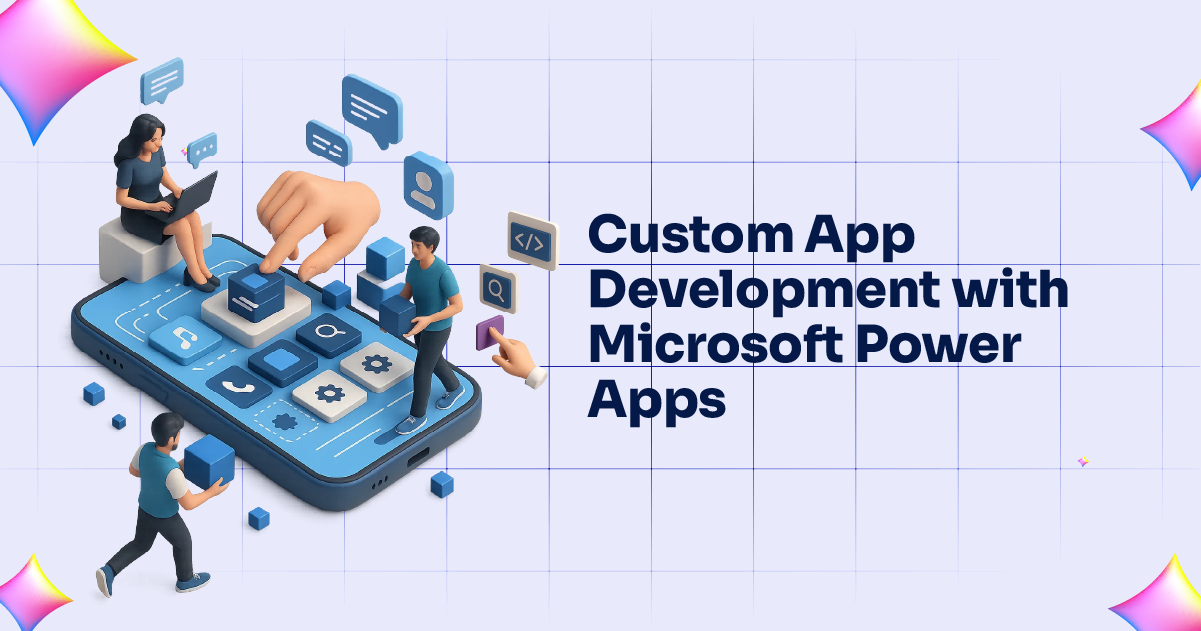
In today’s fast-paced business world, staying ahead of the curve requires agility and efficiency. One way organizations can achieve this is by streamlining their operations through custom app development. But building apps from scratch often requires a significant investment of time, resources, and expertise. Enter Microsoft Power Apps, a powerful tool that enables businesses to create custom applications quickly and efficiently without the need for extensive coding knowledge.
What is Microsoft Power Apps?
Microsoft Power Apps is part of the Microsoft Power Platform, designed to empower both technical and non-technical users to build custom applications. Whether you need to automate workflows, integrate data from various sources, or create mobile apps that run on different devices, Power Apps simplifies the process. The platform leverages a low-code approach, meaning users can design and deploy apps with minimal hand-coding, making it accessible even for those without formal programming training.
Power Apps integrates seamlessly with other Microsoft products, such as Microsoft 365, Dynamics 365, and Azure, creating a unified ecosystem for businesses to develop their apps. By using Power Apps, businesses can address specific needs, solve problems, and improve workflows without relying on third-party developers or costly software solutions.
Why Choose Power Apps for Custom App Development?
1. User-Friendly Interface
One of the most significant advantages of Microsoft Power Apps is its intuitive interface. The platform’s drag-and-drop functionality allows users to easily design apps without requiring coding expertise. The user-friendly interface ensures that business teams can focus on solving real-world problems rather than getting bogged down by technicalities.
2. Speed and Efficiency
Developing custom applications traditionally takes time, but Power Apps drastically reduces the development cycle. Whether you’re creating apps for internal processes, customer-facing services, or automation, the speed at which you can create and deploy applications is unmatched. Users can get a fully functional app up and running in a matter of days or even hours, compared to the weeks or months it might take with traditional development methods.
3. Cost-Effective Solution
Building custom applications from scratch can be costly, particularly for small and medium-sized businesses. The traditional approach requires hiring skilled developers, purchasing tools, and maintaining infrastructure. Power Apps, on the other hand, offers a cost-effective solution that reduces overhead and gives businesses the ability to manage their applications without relying on expensive external resources. Moreover, the platform is priced affordably, especially for businesses already invested in the Microsoft ecosystem.
4. Integration with Microsoft Ecosystem
For organizations already using Microsoft 365 and other Microsoft products, Power Apps provides seamless integration. You can easily integrate data from applications like SharePoint, Excel, Teams, and more into your custom app. This allows businesses to leverage existing systems, reduce data silos, and ensure that their new app is working in harmony with other tools they use daily. Power Apps also supports integrations with over 200 data sources, ensuring that businesses can work with their preferred systems.
5. Scalability
As businesses grow, their app development needs evolve. Power Apps supports scalability, meaning businesses can start with simple applications and expand them over time to meet new requirements. Whether you’re developing a small app for a specific task or a comprehensive solution for your entire organization, Power Apps grows with you. The platform is built to handle apps of all sizes, ensuring that you won’t outgrow it as your needs increase.
6. Security and Compliance
Microsoft Power Apps comes with built-in security features that are crucial for businesses handling sensitive data. The platform follows strict security protocols and is compliant with various industry regulations, including GDPR and HIPAA. Users can also manage access controls to ensure that only authorized personnel can interact with specific data and features. This built-in security makes Power Apps a reliable choice for businesses that need to ensure their apps are secure and compliant.
7. Customization and Flexibility
Despite being a low-code platform, Power Apps offers a high degree of customization. Users can tailor apps to their exact specifications by adding business logic, workflows, and automation. For developers, Power Apps also offers the ability to write code to enhance the app’s functionality further. This flexibility allows organizations to create apps that precisely fit their needs, ensuring that no features are compromised.
Types of Apps You Can Build with Power Apps
Microsoft Power Apps is versatile and can be used to create various types of applications, including:
- Canvas Apps: These are highly customizable apps that provide complete control over the user interface (UI). You can start with a blank canvas and design the app’s layout, ensuring it aligns with your business’s specific needs.
- Model-Driven Apps: These apps are built around your data model. Instead of starting with a blank canvas, users define their data structure, and Power Apps automatically generates a responsive user interface. This is ideal for apps that require complex data interactions.
- Portal Apps: Portal apps allow businesses to create websites for external users, such as customers, partners, or suppliers. This enables organizations to create user-friendly interfaces for non-technical users who need access to data and services without using traditional desktop apps.
Real-World Applications of Power Apps
- Automating Manual Processes: Power Apps can automate repetitive tasks and workflows, saving time and reducing human error. For example, businesses can automate approval processes, data entry, and notifications.
- Data Collection and Reporting: Organizations can create apps for collecting data in real-time, allowing employees to capture data directly from mobile devices or tablets. This data can then be analyzed and used to generate reports or drive business decisions.
- Employee Management: Companies can create custom apps for tracking employee performance, attendance, and other HR-related tasks, improving productivity and ensuring that HR processes are streamlined.
How Power Apps Can Help Your Business
For businesses looking to enhance their app development processes, Microsoft Power Apps offers an unparalleled combination of ease, speed, and functionality. Whether you need to automate tasks, enhance customer experiences, or drive internal efficiency, Power Apps provides the tools necessary to develop custom solutions quickly and at a fraction of the cost of traditional app development.
To learn more about how Power Apps can transform your organization’s app development process, check out this Microsoft Power Apps guide.
In conclusion, custom app development doesn’t have to be complex or expensive. With Microsoft Power Apps, businesses can leverage a powerful, scalable, and cost-effective solution to create the apps they need to stay competitive in an increasingly digital world. Whether you’re looking to improve internal workflows or deliver a better experience for your customers, Power Apps simplifies the development process and delivers results faster than ever before.
